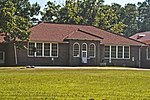Bennett Place
American Civil War museums in North CarolinaAmerican Civil War sitesBuildings and structures in Durham, North CarolinaHistory of Durham, North CarolinaHouses in Durham County, North Carolina ... and 9 more
Houses on the National Register of Historic Places in North CarolinaJoseph E. JohnstonMuseums in Durham, North CarolinaNational Register of Historic Places in Durham County, North CarolinaNorth Carolina State Historic SitesNorth Carolina in the American Civil WarOpen-air museums in North CarolinaTreaty signing historic sitesWilliam Tecumseh Sherman

Bennett Place is a former farm and homestead in Durham, North Carolina, which was the site of the last surrender of a major Confederate army in the American Civil War, when Joseph E. Johnston surrendered to William T. Sherman. The first meeting (April 17, 1865) saw Sherman agreeing to certain political demands by the Confederates, which were promptly rejected by the Union cabinet in Washington. Another meeting had to be held (April 26) to agree on military terms only, in line with Robert E. Lee’s recent surrender to Ulysses S. Grant. This effectively ended the war.
Excerpt from the Wikipedia article Bennett Place (License: CC BY-SA 3.0, Authors, Images).Bennett Place
Bennett Memorial Road, Durham
Geographical coordinates (GPS) Address Website External links Nearby Places Show on map
Geographical coordinates (GPS)
| Latitude | Longitude |
|---|---|
| N 36.029166666667 ° | E -78.975555555556 ° |
Address
Bennett Place
Bennett Memorial Road 4409
27705 Durham
North Carolina, United States
Open on Google Maps








